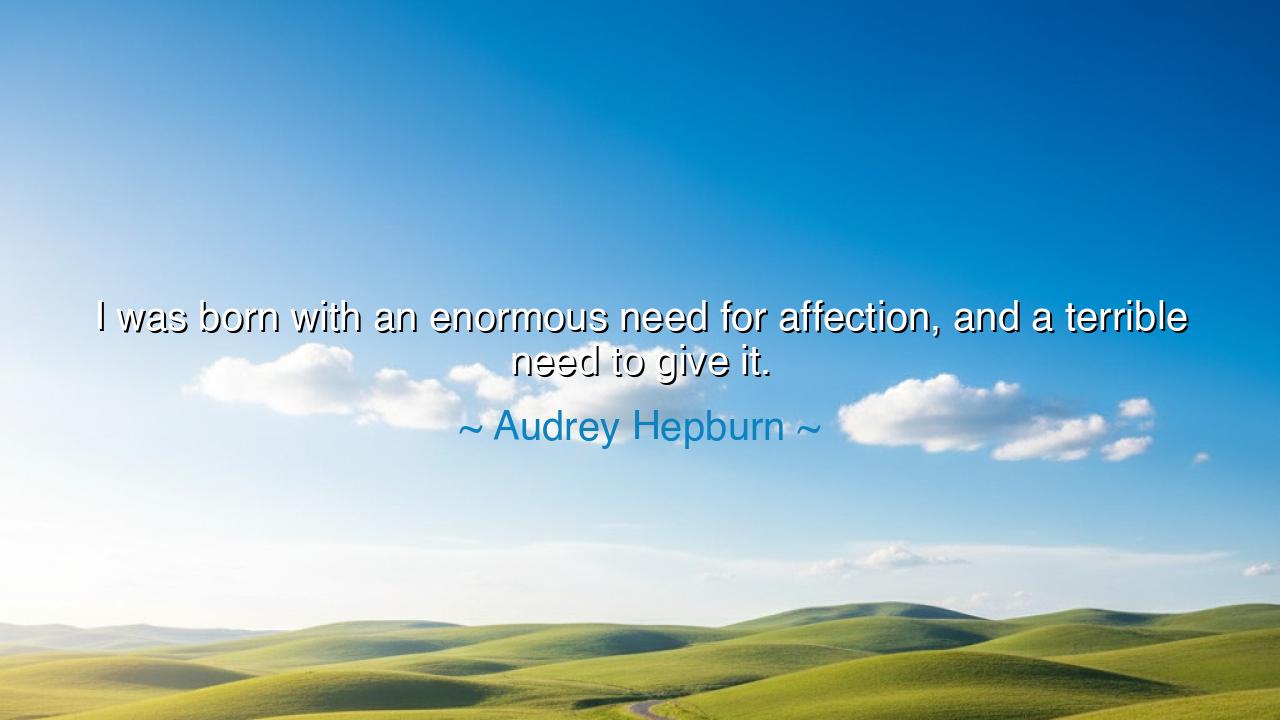
I was born with an enormous need for affection, and a terrible






"I was born with an enormous need for affection, and a terrible need to give it." These words, spoken by the beloved Audrey Hepburn, reveal a truth about the human condition that resonates through the ages. They reflect a deep, primal need for both receiving and giving affection—a balance that speaks to the very heart of what it means to be human. From the moment we are born, we seek love, and yet, in that very seeking, there exists a powerful urge to offer love in return. This duality, this need both to receive and to give, is a defining characteristic of our nature, one that connects us all to the greater fabric of humanity. It is through love, both given and received, that we find meaning, connection, and purpose.
In the wisdom of the ancients, love was seen as the force that binds the universe together. Plato, in his writings, described Eros as a divine force that connects all things, an energy that drives us toward beauty, truth, and unity. For Plato, love was not just a simple emotion, but the force that shaped the very fabric of existence. To give love and to receive it were, in his eyes, not only natural but necessary acts that complete the human experience. The heart, in its deepest need, must both receive and offer love to find fulfillment. Without this exchange, the soul remains incomplete, always longing for the connection that only love can provide.
Consider the life of Mother Teresa, who, in her selfless service to the poor, embodied both the need to give and the profound fulfillment that comes from it. She gave affection to those who had nothing, offering her love to the sick, the destitute, and the dying. Yet, in this giving, she also found herself deeply nourished. Mother Teresa often spoke of the love she received from those she helped. It was a love that fed her soul, even as she gave everything she had. Her work was built on the understanding that love is both a need and a gift, one that is exchanged between giver and receiver, enriching both parties. Her life was a testament to Hepburn's words—she was both a vessel for love and a wellspring from which love flowed endlessly.
Similarly, Audrey Hepburn’s own life was marked by a balance of both needing and giving affection. Her childhood, scarred by the tumult of war, left her with a deep yearning for connection. But as she grew, she learned not only to seek affection but to pour her love into the world. She became not just an icon of beauty and grace, but an embodiment of compassion. In her humanitarian work, particularly with UNICEF, Hepburn gave of herself wholeheartedly, yet she never ceased to acknowledge the love that she, too, needed. Her life was a dance between receiving love from others and giving it away in equal measure—a dynamic that filled her life with purpose and deep fulfillment.
Hepburn's quote speaks to a universal truth: we are not meant to live in isolation, but to connect with others through the act of love. This need for both affection and the capacity to give it is rooted in our shared humanity. Without one or the other, the cycle of love is incomplete. The very act of giving love requires that we receive it in return, just as the sun gives light to the earth, and the earth receives it to nourish life. Both are necessary, for the cycle of love is a two-way street, a dynamic that sustains us through both giving and receiving.
Let us also consider the profound love between Romeo and Juliet, whose tragic tale encapsulates the extremes of the human need for love. Their love was at once pure and all-consuming. They gave everything to each other, knowing full well that they had nothing to guarantee their happiness, yet their love transcended even death. Though their love story was short, their need for each other was so strong that it defined their very existence. In their union, we see the fullness of Hepburn’s sentiment: they were two souls bound together by the desperate need to give and receive love, each fulfilling the other’s deepest need.
The lesson from this quote is simple yet profound: love is a powerful, essential force. We are born with an innate desire to love and to be loved. This need to both give and receive affection is at the core of what it means to be human. It is through this exchange that we find connection, meaning, and fulfillment. If we seek only to receive love, we may find ourselves hollow and unfulfilled, as true love is a dynamic, not a one-way street. But if we only give, we risk depleting ourselves, forgetting that we too need to be nourished by the love of others.
Therefore, in our own lives, let us seek a balance between receiving and giving love. Let us open our hearts to others, not just to take, but to share what we have to give. In relationships, whether with family, friends, or a romantic partner, let love flow freely, understanding that both the giving and the receiving nourish our souls. Let us also remember that, like Audrey Hepburn, we all have a need for affection, but in giving it to others, we fulfill that need in the most profound and meaningful way. In this exchange, we find the true joy of connection, the beauty of love’s balance, and the fulfillment that comes from being both giver and receiver.






AAdministratorAdministrator
Welcome, honored guests. Please leave a comment, we will respond soon